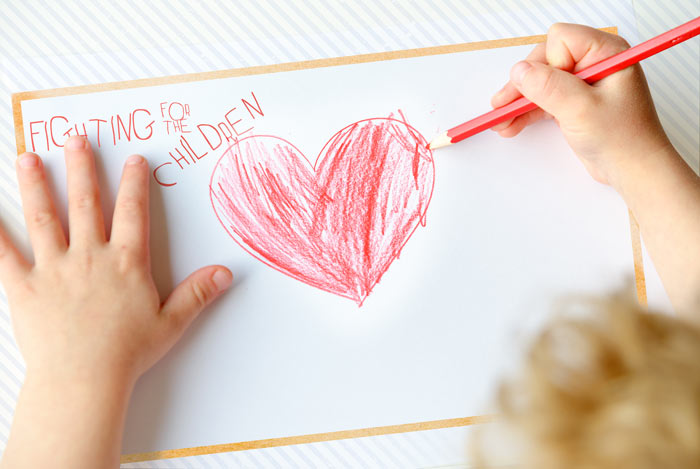
For PJ Condray and Peg Donovan, there is no better feeling than giving a voice to victims who cannot speak for themselves. The victims they represent are part of the estimated 679,000 children who are maltreated each year in the United States. These children are victims of abuse or neglect usually stemming from unstable families and complicated home lives. However, the hearts of a diligent group of volunteers are big enough to help these victims recover from abuse or neglect and move on with the rest of their lives. The people that step in to represent these children are Guardian ad Litem volunteers.
The Florida Guardian ad Litem (GAL) program is a key component of ensuring the welfare of children who are referred to the Florida Department of Children and Families. The program is a partnership involving attorneys, case managers and volunteers that work together to help abused and neglected children. The combination of professional staff and volunteer advocates has proved to be a powerful force in protecting the interests of Florida’s abused children.
The GAL program is divided into local offices for each circuit court. The local GAL program serves the Fifth Judicial Circuit of Florida, which includes Citrus, Hernando, Lake, Marion and Sumter counties. GAL attorneys work pro bono and are used to guide GAL teams through court. They use their expertise to ensure that the courts rule in favor of the child’s well-being. The well-being of the child is represented by GAL volunteers.
The “ad Litem” in Guardian ad Litem is translated as “for the suit” in Latin. So, essentially, the volunteers serve as the court-appointed guardian of the child during court proceedings. They work in conjunction with several legal entities, including court systems, attorneys and child protective investigators to advocate the rights and needs of the child they represent. Volunteers are assigned a child advocacy manager (CAM) who helps supervise and support them along the way.
GAL volunteers have complex roles. In fact, there really isn’t a typical day in the life of a volunteer because each day comes with a new role. One day they work as an investigator, uncovering clues about the child’s situation by conducting interviews with family, friends, neighbors and school members. Another day they may function as a mediator, developing collaborative relationships between all of the involved parties to reach an understanding. Homes, schools and courtrooms are only a few places a volunteer could consider their “office.” Despite the chaos, they continue to give it 100 percent and represent the best interest of the child.
Meet PJ Condray
Citrus County resident PJ Condray has been a dedicated GAL volunteer for six years and admits that it takes a considerable amount of commitment. Condray believes the decision to start volunteering with GAL begins with the feeling of doing something useful.
Condray says her experience on mission trips to third-world countries helped her decide that the GAL program was a perfect fit. For her, the GAL program provided the closure she didn’t feel on mission trips.
“We would build schools, teach children… then we would walk away,” Condray says. “It’s knowing that each case we are brought will come to a conclusion that motivates me.”
A conclusion is exactly what maltreated children need to recover. The ultimate conclusion, to her, is placing a child in a better situation than when the child arrived, whether it’s through the result of a foster home or reunited with family.
The situations that Condray experiences through helping these children can leave heavy impressions on her heart. She recalls a little girl who was severely abused. She was picked up by the police and transported directly to the hospital.
“We didn’t think she was going to live,” Condray said. “She survived; it was a miracle, and she was ultimately adopted.”
The driving force behind Condray’s continued volunteer work is the knowledge that the system works.
“It’s about the children,” Condray explains. “The children have no advocate.”

Meet Peg Donovan
Peg Donovan, a Hernando County resident, decided to become a GAL volunteer after she picked up a brochure while volunteering for an Alzheimer’s respite program. Her love for children and previous aspirations for becoming a teacher proved to be the deciding factor. Shortly after picking up the brochure, she convinced her newly retired brother-in-law to apply with her.
“The rest is history,” Donovan says.
Her favorite part of the program is meeting and visiting with the children. The children that Donovan helps come in various ages, genders and backgrounds, but they all have one thing in common: They are in difficult situations and need help. She has helped 101 children since she began volunteering eight years ago. Of the children that she has helped, she’s proud to say that 12 have been adopted and three are waiting for their forever family through the adoption process.
While most of the time the cases turn into happy endings, some situations reverse themselves. Donovan recalls a case early in her GAL career where an unstable family life led a young girl down a path of drug addiction and teenage pregnancy. The young girl never finished the seventh grade and moved from place to place. Her young daughter is now in the care of her aunt. This particular case has always stuck with her.
“As hard as I tried, there was no helping her,” Donovan says. “I don’t see a future for her at all and only pray that someday she will get the help she very much needs.”
Happy endings are far more common than instances like these. Most of the time parents cooperate with volunteers like Condray and Donovan, and they work together to find happy mediums that benefit the child. The process may be lengthy and tedious, but Donovan finds joy in knowing everything she does contributes to the well-being of an abused, neglected or abandoned child.
“Everything I do, from visiting the children, meeting with their parents and caregivers, working with their caseworkers, attending meetings, writing reports and representing the children in court, are all part of making sure that their future, whenever possible, is with their parents or a family member,” Donovan explains.
The situations that Condray, Donovan and other volunteers experience can be difficult and often heartbreaking, but they do it because the GAL program works. The program gives children an advocate when they need it the most.
Volunteer!
The GAL program values its volunteers. The organization holds a recognition event for all the volunteers where they choose one “Volunteer of the Year” from each county in their district. The Child Advocacy Managers truly care about their volunteers and the work they do for the program. They build strong relationships with volunteers and provide a rewarding atmosphere for them.
“They will tell you when they think it would be best to take a break from a case or take a couple days off,” Condray says. “They value your work and show compassion for their volunteers.”
However, true gratification comes from the lives that GAL volunteers change.
“Volunteers have the satisfaction of knowing they are making a lifelong difference to a child and family as well as to the next generation and the next,” Director of Recruitment Sarah Jay says. “They build a relationship with particular children and are able to know that their actions and words make a difference.”
Do you have a passion for helping children? GAL volunteers have represented over 200,000 children to date, and the program now has approximately 10,000 volunteers. Unfortunately, they don’t have enough volunteers to cover the vast amount of Florida children who need their help.
If you’re interested in becoming a voice for maltreated children, consider volunteering for the GAL program. The program provides 30 hours of certification training and endless support. Volunteers usually spend an average of 10 hours a month working on a case. Some cases may take more time or less, depending on the situation. Find out more information on becoming a GAL volunteer by visiting guardianadlitem.org or calling (866) 341-1GAL.
Volunteer FAQ
Sarah Jay, Guardian ad Litem’s director of recruitment, answers common questions about volunteering:
Q: How are volunteers essential to the program?
A: The volunteers are the ones out there meeting the children, learning about them, speaking for them in the court room and connecting to their teachers and counselors to make sure they are receiving all the help they need and deserve.
Q: Is the volunteer program flexible? Can a person volunteer part of the year?
A: Yes, these volunteers typically take cases called “courtesy cases.” These are cases in which children are placed temporarily in our area, while their court case is located out-of-county. We rely on the monthly visits of these volunteers.
Q: How much support is given to volunteers?
A: Anyone in our offices is available for volunteers whenever they need us. If a volunteer goes away on vacation, staff and other volunteers step in to help. Each volunteer is also supported by a volunteer mentor.
Q: Are there other ways to help?
A. We have a non-profit foundation called “Voices for Children of North Central Florida.” This foundation raises funds to provide for the urgent needs of children as well as for opportunities for special medical or extracurricular activities that contribute to a child’s healing or simply bring personal growth, joy and “normalcy” to their lives. Voices is always looking for volunteers to help at periodic events, as well as hard-working board members and people who are willing to share their marketing, legal or software expertise.
Learn More
Guardian ad Litem
guardianadlitem.org
Fifth Judicial Circuit
Marcia Hilty, Circuit Director
110 N Magnolia Avenue, Ocala
Represents Citrus, Hernando, Lake, Marion & Sumter County
(352) 671-5757
Voices for Children of North Central Florida
(352) 484-0319
voicesofcentralfl.com
Need Help?
If you suspect child abuse, neglect or abandonment, please call:
Florida Department of Children and Families
24/7 Abuse Hotline: 1-800-962-2873
reportabuse.dcf.state.fl.us
If you suspect a child is in immediate danger, call 911.
Sources: guardianadlitem.org, dcf.state.fl.us, cf.hhs.gov






